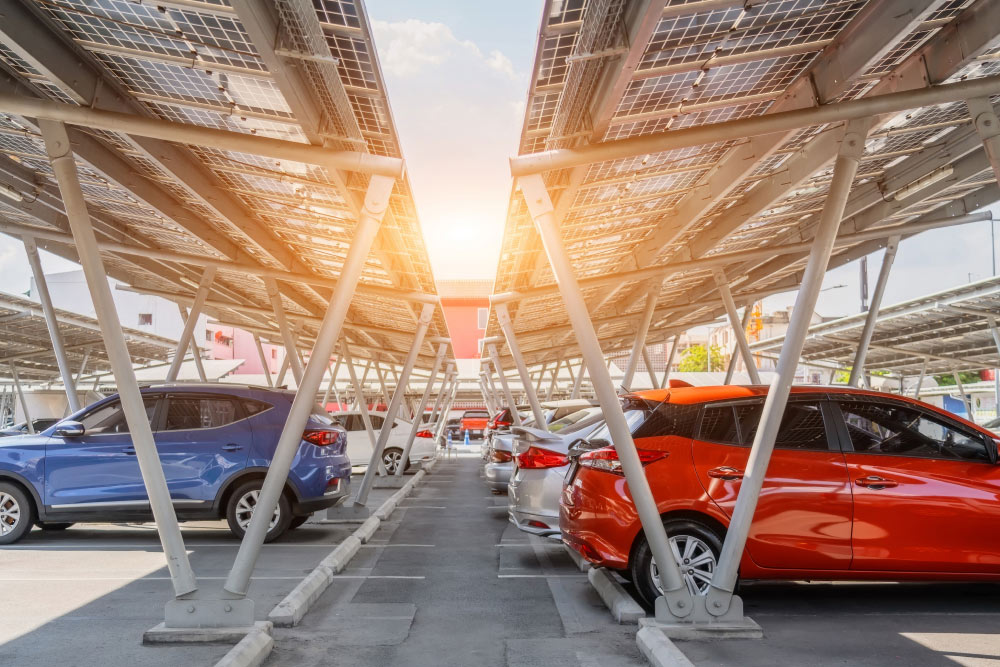Things to Know Before Installing Solar Carports
Solar carports help generate solar energy while protecting one’s car. They are quite popular among both homeowners and businesses looking for ways to generate renewable energy. Solar carports are more convenient, simple, and accessible than conventional rooftop solar panels and are also cheaper to install since one is eligible for tax incentives. Before installing them, it is important to know how they work and the possible benefits one may enjoy.
What are solar carports?
Solar carports look quite similar to canopies that are installed over parking spaces. The only thing that differentiates them from regular carports is that they can trap solar energy.

The working mechanism of a solar carport is quite simple. Most of them have solar panels that trap the heat energy from sunlight and convert it into electricity, which can be used to power appliances in houses or businesses. This is why they are a good option for those planning to lower their carbon footprint and dependency on fossil fuels. One can also charge their electric vehicle with the power generated.
Benefits of solar carports
Solar carports can be installed in both homes and business complexes.
- Maximizes space
Conventional rooftop solar panels are not always feasible because they can affect the home’s structure and aesthetics. So, instead of installing the panels on the roof of the house, one can install them on a carport. By doing so, one can maximise the available space. - Reduces vehicle temperature
Solar carports absorb a lot of heat and provide shade to the car parked under it, reducing its temperature. This can extend the life of the car’s interior components and prevent issues that arise due to excessive heat. - Adds value to the property
Homes and businesses that rely on renewable energy solutions like solar panels have higher property value. This is because the solar installations highlight the property owner’s commitment to eco-friendly and sustainable living. - Improves energy independence
With solar-based carports, a home or business can generate its own energy. As a result, they need not depend too much on grid energy, lowering energy costs. - Positive environmental impact
Solar-based carports generate clean and renewable energy, so one’s carbon footprint automatically reduces. This makes them an ideal installation for those looking to take steps to save the planet.
Considerations when installing solar carports
One must never decide in haste when installing a solar carport. For the best outcome, it’s important to consider several factors, like the vehicle’s size, the panels’ energy output, and whether or not to ask a professional for help.
- Size
In general, the size of a typical midsize vehicle in Europe is around 4.5 x 2 meters. Meanwhile, the standard size of a residential solar panel is about 1.6 x 1 meter. So, if a carport has to provide coverage for two parked cars, around 20 to 24 solar panels will be needed to cover the area. - Structural strength
As a single panel weighs around 18 kilograms, a carport that has around 20 panels will have to hold over 360 kilograms of weight. This means the structure must be durable. If the roof is weak, it may collapse, damaging the vehicle and leading to a huge financial loss. - Output
Usually, a solar panel can generate between 270 and 300 watts of power. If a carport system has 20 panels, the energy produced can be anywhere from 5.4 to 6 kilowatts. Similarly, a 24-solar panel carport can generate 6.4 to 7.2 kilowatts of energy. In most cases, this is enough to cover the yearly energy requirements of an average household. - Installation
While the installation process is generally simple, several important factors must be considered. For starters , one must decide whether to fix the panels by themselves or call a professional. Several solar carport companies help homes and businesses install these structures. Hiring such services is advisable if one does not have the experience or skills required for electrical and mechanical work. The best solar companies for carports offer special services and kits to businesses and homeowners, making installation easy.
Solar carport cost
The cost of a solar carport can vary based on multiple factors, such as the number of vehicles it covers and whether one installs it themselves or hires a professional. On average, residential rooftop solar installations can cost about €1.80 to €2.20 per watt. A standard 5.4-kilowatt system can range between €9,720 and €11,880. At the same time, the cost of a 7.2-kilowatt system can start from about €11,520 and go up to €15,840.
Solar carports have a simpler installation process than conventional rooftop systems, so the costs will be lower. A 20-panel carport system will cost approximately €3,300. Meanwhile, a 24-panel solar carport may cost around €3,950. After adding the expenses related to permits, wiring, racking, and the frame, the total cost of a DIY project should range between €4,500 and €12,500. The price can be lowered by taking advantage of financial incentives like local rebates and tax deductions.
With professional installations, the overall costs can be slightly higher. This is because of the soft costs involved, such as inspections, additional permits, and design.

